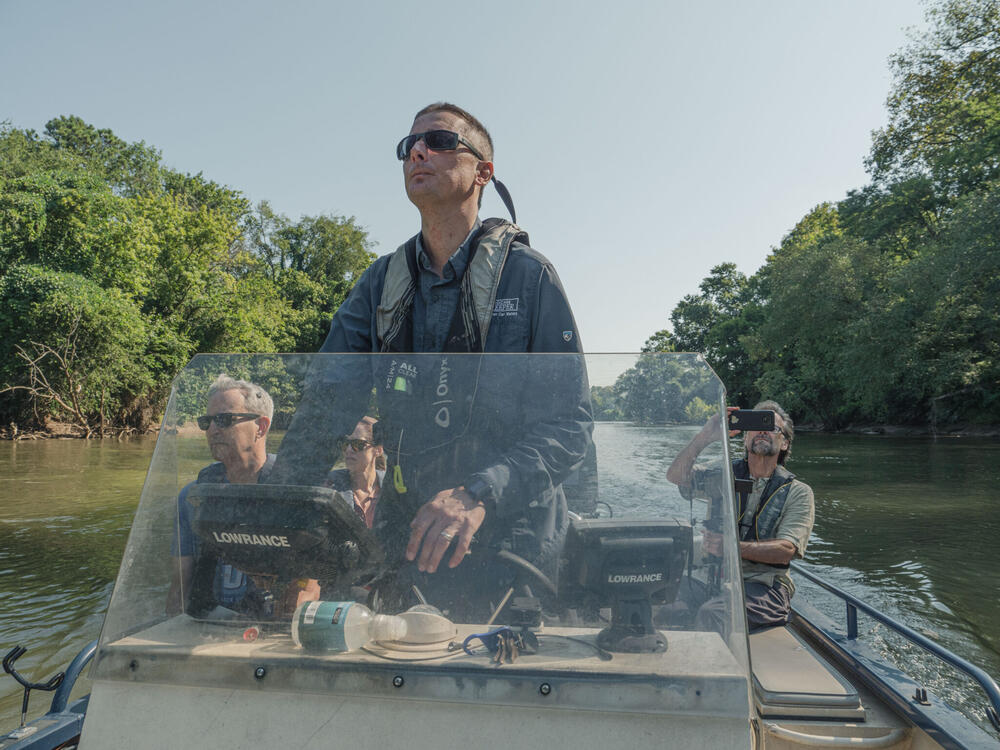
Caption
Chattahoochee Riverkeeper Jason Ulseth leads a team in monitoring water quality and groundwater levels along the river that provides drinking water to millions of Georgians.
Credit: Photo submitted by Chattahoochee Riverkeeper

Chattahoochee Riverkeeper Jason Ulseth leads a team in monitoring water quality and groundwater levels along the river that provides drinking water to millions of Georgians.
Routine water sampling conducted by the Chattahoochee Riverkeeper as part of a federal partnership revealed alarming levels of bacteria discharged into the river by Fulton County’s largest wastewater treatment plant in 2023.
The Georgia Environmental Protection Division issued several violations and a $300,000 fine against the city of Atlanta for maintenance problems causing numerous illegal discharges of pollution at the RM Clayton Water Reclamation Facility in northwest Atlanta.
Chattahoochee Riverkeeper’s Chris Manganiello considers the Fulton County pollution drama as a reason to sound the alarm over the now-uncertain future of the U.S. Geological Survey’s South Atlantic Water Science Center in Norcross.
The center’s lease recently appeared on the Elon Musk-led U.S. Department of Government Efficiency’s list for possible terminations by the end of 2025, but it’s still unclear what that means for the staff and the program’s mission.
The U.S. General Services Administration, which manages federal property, did not respond to the Recorder’s emailed questions about the terms of the lease and the fate of the staff.
Since the early 2000s, the Chattahoochee Riverkeeper and the federal agency have collaborated on the BacteriALERT program that provides live updates to the public of the amount of E. coli contamination in a river that is a source of drinking water for millions of Georgians.
“Eventually after working with Fulton County, they came to an agreement with us that their plant was not functioning,” Manganiello said. “This is a situation where we’re pretty sure that we wouldn’t have identified this problem without the help of collection from USGS sources.”
Environmentalists and Democratic congressional members are expressing concerns about the planned lease termination, which the DOGE website says will save the federal government more than $1.3 million.
The center is one of more than a dozen government offices in Georgia that could have its leases ended under the Trump administration’s cuts.
Riverkeeper members said that water gauges are essential for maintaining compliance with state and federal permits. The data collected by these gauges tracks flood levels and the National Weather Service contracts with the center to collect rainfall data.
Manganiello, the Riverkeeper water policy director, said that the closure of the Norcross office and potential layoffs could at a minimum disrupt water monitoring for several months, which could lead to a significant decline in water quality and compliance.
“It’s one thing if we all knew they’re going to close this office because they moved into another location, that would be okay,” he said. “But because we don’t know what’s going to happen if the lease is terminated and these people don’t have a place to physically work, that means there’s going to be a disruption in the maintenance of the physical equipment and to data collection and data processing.”
Chattahoochee Riverkeeper Jason Ulseth said the center operates water flow gauges essential for monitoring everything from bacteria to water flooding levels impacting water management in Georgia, South Carolina, and North Carolina.
“This science center is critical for many reasons, including the fact that they run all of the flow gauges for Georgia, South Carolina and North Carolina,” Ulseth said. “These flow gauges tell us how much water is in any part of the river throughout the system and is essential to municipal water to decision makers, dam operators, (utility) power operators and fishermen.”
The government water monitoring benefits the Chattahoochee River National Recreation Area, which draws 3.5 million annual visitors.
The scientific water surveying covers a 48-mile stretch between the Buford Dam and Atlanta. The employees also track water levels, flooding and dam releases at the Buford Dam.
“They’re fishing, they’re tubing, they’re kayaking,” Ulseth said. “So the health of the river and the amount of pathogens that are in the river are very important to the people that are going there. With the bacteria alert program, we are able to actually predict the current levels of E. coli and give public health advisories in real time, which is a one-of-a-kind program in the entire country.”
Atlanta Democratic U.S. Sens. Jon Ossoff and Raphael Warnock expressed their concerns about potential layoffs in a letter to U.S. Secretary of the Interior Doug Burgum.
The relocation plans remain unclear despite the office lease set to terminate in a few months, the senators wrote Tuesday.
“Staff at the (center) perform water quality testing to ensure the safety of drinking water and maintain water gauges across Georgia, including Lake Sidney Lanier and on the Chattahoochee River, which supplies most of metro Atlanta’s drinking water,” Ossoff and Warnock wrote. “Local officials in metro Atlanta rely on gauges at Lake Lanier to ensure enough water is drawn from the lake to provide water to millions of Georgians every day. These gauges also inform water flows for Georgia’s agriculture industry, nuclear reactors across the state, and Department of Defense installations, among others.”
The potential ramifications of staff layoffs at the Norcross science center is also being watched closely by Suwannee Riverkeeper John Quarterman in south Georgia.
He said his organization relies on the data to predict the risk of flooding in areas like the Skipper Bridge on the Withlacoochee River north of Valdosta.
“It will be a problem for flood preparedness if (flood mapping) goes away, or if either of those gauges does,” Quarterman said.
This story comes to GPB through a reporting partnership with Georgia Recorder.